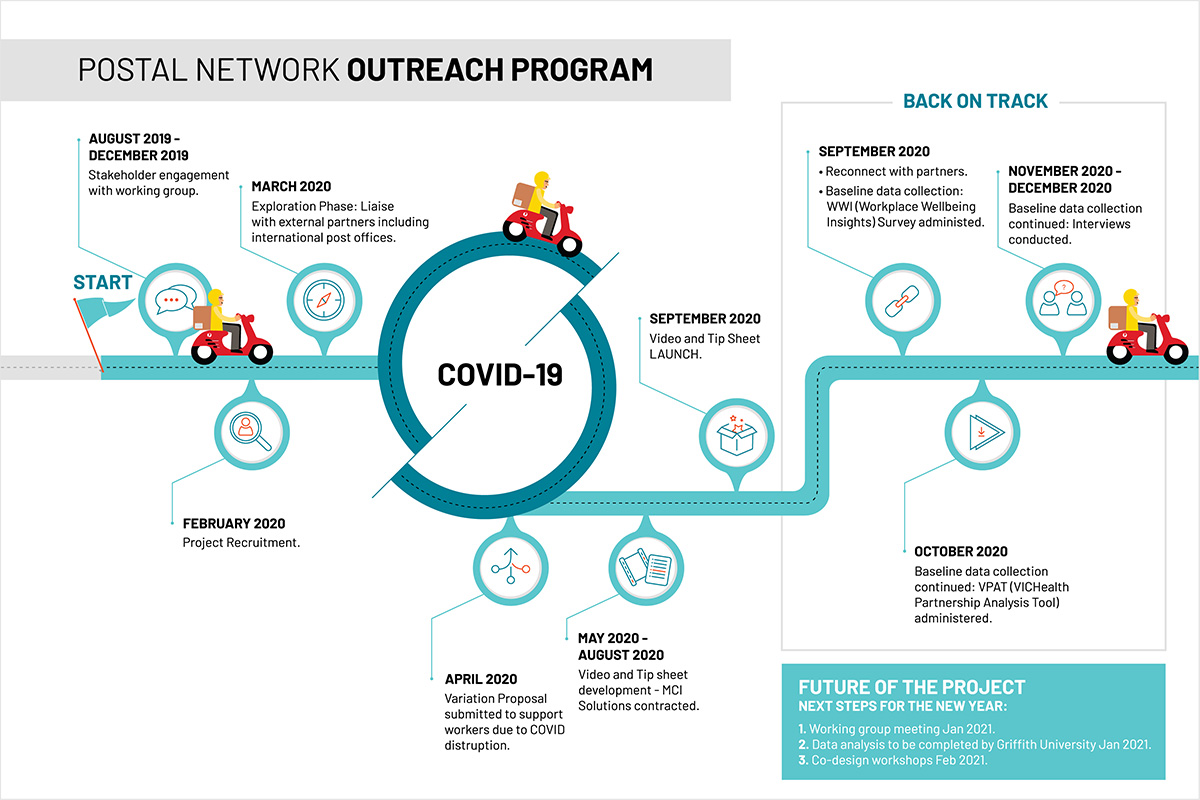WorkWell
How to deliver mental health and wellbeing support to postal office and delivery workers across Victoria, with Australia Post and WorkSafe Victoria.

GOALS
- Understand the psychosocial risks that may lead to mental injury and/or compromised mental health for Licensee Post Office and Community Postal Agency employees and Contract Delivery Drivers.
- Address risks using sustainable and outcome driven solutions.
- Develop a program to prevent risks in the long-term.
APPROACH
- Project team established to explore the psychosocial risks in the postal sectors.
- Create and provide easy access to support material on how to increase awareness of psychosocial risks.
- Survey workers to identify further risks and opportunities to expand and develop services.
- Detailed interviews with individuals for deeper insights into mental health risks.
RESULTS
- Identified several risks and issues facing workers which can be alleviated with the program.
- Created first round of program content to support workers and highlight risks.
- Program framework established to allow further expansion of services with a focus on preventing risks and mental health issues.
Background
With frontline workers across Victoria’s substantial postal network facing multiple challenges, hazards and risks to their mental health, both Australia Post, alongside WorkSafe Victoria, knew more needed to be done to support the wellbeing of employees.
The target population are not direct employees of Australia Post, but rather franchise owner operators or contractors.
These workers in particular are more difficult to support due to the geographical spread of the locations within the network, which includes:
- 806 Licensed Post Offices (LPOs)
- 58 Community Postal Agencies (CPAs)
- Over 1,000 contract delivery drivers
The owners/operators of post offices also have varied cultural, economic, and educational backgrounds.
Plus, as well as postal services, many are required to provide finance, insurance and identity and document services to regional communities, adding to the pressure of customers who rely on them as the only business to deliver these services locally.
Additional factors across the network include:
- Large number of dispersed local businesses across Victoria’s regional areas.
- Isolation of workers where they are the only business in a remote area.
- Long hours and self-employment add difficulties for training and upskilling.

Exploration
Communicorp established a project working group and held consultation with Australia Post's Safety Manager for Community and Consumer, to identify several challenges faced by workers across the network.
Communicorp also reached out to Canada Post and New Zealand Post to examine common risks and solutions across similarly challenged networks.
A literature review was completed on psychosocial risks in the postal sector, which is currently being reviewed for publication in an appropriate academic journal.
Key findings from the literature review were:
- Literature outlining the state of psychosocial risk within the postal sector at an international scale is limited
- Workplace risk factors identified across the literature were isolation, job demands, occupational violence and aggression, job instability (including financial strain) and bullying and harassment
- Risk factors have remained relatively constant over the last 20 years of literature
The program working group identified several factors with the highest need for intervention:
- Violent or traumatic events (specifically aggressive customer behaviour)
- Jobs with either high or low demands
- Remote and isolated work
- Poorly managed organisational change
Impact of COVID-19
Ongoing communication across the network and with international postal agencies became increasingly difficult from March 2020 with the global spread of the Coronavirus.
Communicorp adapted to the changing conditions with a commitment to new milestones in order to continue the program through the pandemic.
This included the plans for baseline data collection (Workplace Wellbeing Insight (WWI) survey) being put on hold due to the greater demand of postal and delivery services across the state, economic pressures and an expected low response rate.
Consultation with the working group indicated a desire to provide support to the target population in any way possible, during the global COVID-19 pandemic.
A variation proposal was submitted with additional milestones to be delivered over the 2020 period.
Communicorp adapted to the changing conditions with a commitment to new milestones in order to continue the program through the pandemic.
Enabling workers to access support tools
A big challenge was to maintain open communication with all stakeholders in the project and enable workers across the postal network to access support material.
The project team developed videos and tip sheets aimed at increasing awareness of psychosocial risk areas and provide resources to minimise the impact of these risks. Topics included managing difficult customer interactions and managing remote and isolated work.
Five videos and five proactive tip sheets, based on known psychosocial risks in the target population, were published in September 2020 and promoted together with the roll out of the previously postponed WWI survey.
In line with the sustainability principle of the project, the content was selected based on known psychosocial risks in the target population to maximise relevance for the future.
These resources are housed on intranet pages that all individuals have access to and will continue to be referred to across other projects and communications.
Initial learnings
Interviews revealed issues faced by workers and perceptions of mental health risks such as aggressive customer interactions.
By using phone interviews more workers were able to participate from across the state’s various regions.
A lack of time and the increase in demand of delivery services as a result of COVID-19 made it more difficult for workers to access the material or take part in surveys and interviews.
It also became clear that a lack of direct and regular interaction with the workers made it increasingly difficult to follow up from initial conversations.
Next steps
The project team is currently working with researchers at Griffith University to complete a data analysis of the survey results, interviews, and usage of the support materials.
Workshops planned for early 2021 will include representatives from across the target population as well as key stakeholders from within Australia Post.
These workshops will kick off the co-design phase in order to design a prevention led approach to minimising the mental health risks identified in the exploration phase.
Its normal for our workload to fluctuate, and those fluctuations have the potential to impact our sense of wellbeing.
There are many things that influence us as we go about our work. Our relationships, how much sleep we're getting, and the level of our workload are all elements that cause fluctuations in how we feel at work.
It's quite normal when regularly working remotely to feel disconnected and isolated from others.
At all organisations we are occasionally confronted by instances of aggressive behaviour from new and regular customers.
We all experience change in our lives. For many people change brings on feelings of stress and anxiety. It's important to realise these feelings are normal.
